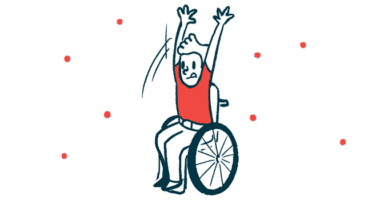SBMA therapy NIDO-361 granted orphan drug status in Europe
NIDO-361, Nido Biosciences’ experimental oral treatment for spinal and bulbar muscular atrophy (SBMA) — a disease type marked by progressive weakness in the muscles of the throat and mouth, and those closer to the trunk — has been granted orphan drug designation in the European Union.
This designation, awarded by the European Medicines Agency, is given to therapies that may improve care for rare or life-threatening conditions affecting no more than 5 in 10,000 people in the EU. It comes with certain incentives, including a reduction in some regulatory fees, trial protocol assistance, and 10 years of market exclusivity if the therapy is ultimately approved.
The award of orphan drug status comes just as the company completed enrollment of its Phase 2 PIONEER KD study (NCT06411912). That trial will assess NIDO-361’s safety and efficacy in about 54 men with SBMA in the EU and in the U.K. and South Korea. The trial is expected to be completed next year.
“There are no treatments currently approved for SBMA in the EU or the US, so the orphan drug designation for NIDO-361 … marks an important step towards developing a new medicine that can transform the lives of patients suffering from this rare and debilitating neuromuscular disease,” Vissia Viglietta, MD, PhD, Nido Bio’s chief medical officer, said in a company press release.
PIONEER KD trial will test SBMA therapy candidate in 64 healthy men
SBMA, also known as Kennedy’s disease, is a genetic disorder caused by mutations in the androgen receptor (AR) gene. These mutations lead to the production of dysfunctional androgen receptors, which are believed to accumulate to toxic levels within motor neurons — the specialized nerve cells responsible for controlling muscle movement.
This buildup ultimately results in damage to the motor neurons, leading to the progressive muscle weakness and wasting (atrophy) of limb and facial muscles characteristic of SBMA. This form of spinal muscular atrophy, which usually starts in adulthood, is characterized by symptoms such as impaired mobility and problems with speech and swallowing.
NIDO-361 is a small molecule that binds to a specific site on the androgen receptor, distinct from the site where androgens and other molecules bind, correcting the problems with the AR protein and restoring cellular health.
The treatment was found to be generally safe and well tolerated in a Phase 1 clinical trial (ACTRN12622000964718) in Australia, with no serious adverse events reported. That trial enrolled 64 healthy men who were given single or multiple ascending doses of NIDO-361 or a placebo.
At Nido Bio, we are at a critical juncture with a fully enrolled Phase 2 study for this program, and we are grateful for the opportunities that this designation provides as we eye the next stages of its advancement.
In the Phase 2 study, the main goal is to evaluate the treatment’s effectiveness, when given orally once daily, in increasing muscle volume, as assessed by magnetic resonance imaging (MRI). The researchers also will evaluate the participants’ responses to treatment by measuring changes in several areas, including daily function, mobility, and muscle strength.
The treatment dosage will be continuously monitored during the trial to determine optimal dosing, which will inform future Phase 3 trials.
“At Nido Bio, we are at a critical juncture with a fully enrolled Phase 2 study for this program, and we are grateful for the opportunities that this designation provides as we eye the next stages of its advancement,” Viglietta said.
The post SBMA therapy NIDO-361 granted orphan drug status in Europe appeared first on SMA News Today.





